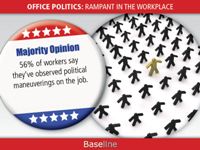I saw a set of questions online about how to manage and mentor marketing interns. As I used to manage and mentor lots of consultants including interns when I worked for Deloitte, I wanted to share my 2 cents. The questions didn’t specify whether these were high school, college, or MBA interns, so I will assume these are college interns ...
How to Improve Your Soft Skills?
How to improve your soft skills is an important question to answer for your career success. It is also a tough question to answer in general as soft skills encompass many different skills in two general categories.
- self management skills– those we use to manage our emotions, self-perception, and reactions to unexpected situations. Examples of these soft skills include stress management, self-confidence, emotion control, etc…
- people skills – those we use to influence how others perceive / receive us, our work, our ideas. Examples of these soft skills include communication skills, leadership skills, teamwork skills, ability to deal with difficult personalities.
Any one of these soft skills will take time to improve. At a high level, here are five tips I recommend to start improving your soft skills today. ...
What are Soft Skills?
I must admit I had no idea what are soft skills when I graduated from college. I quickly realized on my first job at McKinsey how my lack of some soft skills were affecting my performance reviews. Here are some of the soft skills I lacked at that time.
- Stress Management and People Management Skills – At 22 years old, I was assigned an assistant at McKinsey. I treated her horribly when I was stressed out and I was immature to think I have the right to since she worked for me. Needless to say, she was NOT jumping to help me all the time.
- Confidence and Communication Skills – I was book smart and had great ideas on projects, but sometimes I was afraid to speak up when there were senior people in the room. I had no idea how to structure my comments and I didn’t have the confidence to think they would care what I think. McKinsey expects Analysts to voice their opinions.
- Resilience / Office politics skills – I was blamed for something I didn’t do on a project. It took me a few years to move on from this one. My manager succeeded in blaming me because he knew how to play office politics better than me. I had no close support from any partners.
After working 15 years in consulting with 20+ Fortune 500 companies dealing with all kinds of people, personalities, and unexpected situations, I have a much greater appreciation for how important soft skills are to achieve business success. So I would like to offer my own definition of “what are soft skills” in practical terms (see below). ...
Forgive and Forget – Key to Career Success
I had a real scare yesterday. My 3 year old daughter, Isabel, lost her balance and fell from an 8-feet-high rope ladder, head first. I screamed, and although I was a few steps away, I couldn’t reach her in time. She hit the dirt on the side of her head and right cheek. Luckily, her head does not seem to be injured. Besides a shiner on her cheek, she was just super scared. ...
Office Politics – Should I leverage it to further my career?
Early in my career, I have been burnt by office politics but not in the way you think. I didn’t feel burnt because someone else sabotaged my job. On the contrary, I concluded, I burnt myself because I didn’t understand or appreciate office politics and the importance of using it fairly and skillfully to protect and build my career advantage. ...
Mentoring Model – Mutual Mentorship or Paying it Forward?
...
Work for Free – Who Should do it and Why?
1. Should anyone work for free? Yes, everyone should at least consider to work for free as an option. I think it’s important to realize that wasting time also costs money in the long run. As you alluded to, you could be paid doing mediocre stuff and not learning. In this case, you are losing time building experience and therefore you may not get promoted fast or get a better job with higher pay easily. On the other hand, you can work for free and in exchange get great experience on your resume, new skills, or even a chance to turn it into a good paid job. I think the right free work could very well be a great investment of your time. It’s like getting free education without paying for tuition.
2. At what stage do you stop doing free but awesome work? It’s important to set up an agreement up front before you start to work for free as to when and under what condition you will stop working for free. This way you can set expectations up front. For example, I know job seekers who have offered to work for free for start-ups to gain experience and both parties know they will stop either when they find a job or when that start-up got enough funding to pay them. For more examples, see my other article Radical Ways to Find a Job
At the end of the day, whether to work for free is an individual decision. You have to consider three factors before doing it.
...


